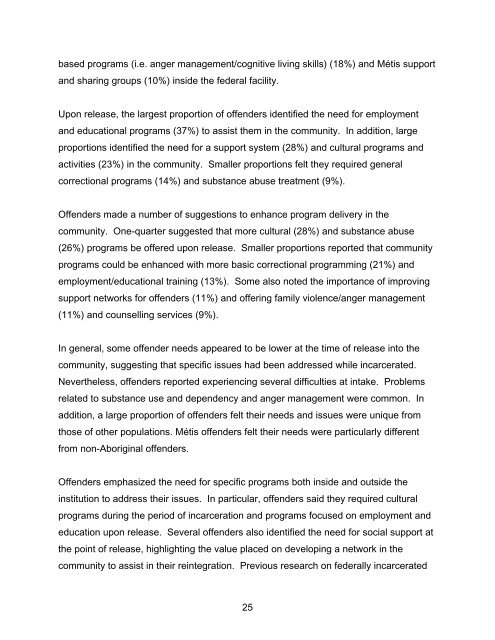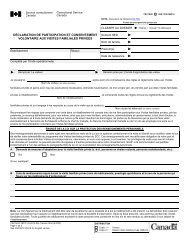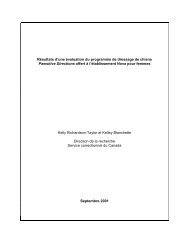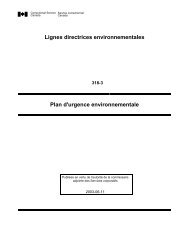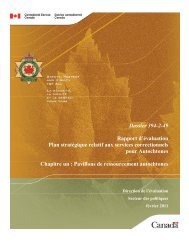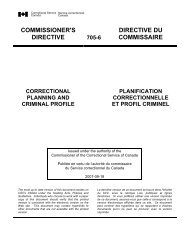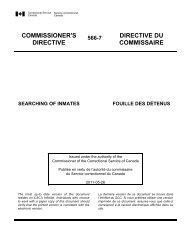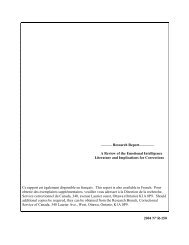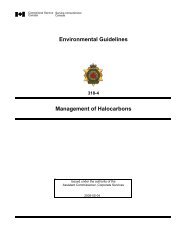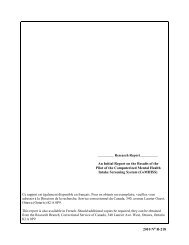Program and Service Needs of Federally Incarcerated Métis ...
Program and Service Needs of Federally Incarcerated Métis ...
Program and Service Needs of Federally Incarcerated Métis ...
You also want an ePaper? Increase the reach of your titles
YUMPU automatically turns print PDFs into web optimized ePapers that Google loves.
ased programs (i.e. anger management/cognitive living skills) (18%) <strong>and</strong> <strong>Métis</strong> support<br />
<strong>and</strong> sharing groups (10%) inside the federal facility.<br />
Upon release, the largest proportion <strong>of</strong> <strong>of</strong>fenders identified the need for employment<br />
<strong>and</strong> educational programs (37%) to assist them in the community. In addition, large<br />
proportions identified the need for a support system (28%) <strong>and</strong> cultural programs <strong>and</strong><br />
activities (23%) in the community. Smaller proportions felt they required general<br />
correctional programs (14%) <strong>and</strong> substance abuse treatment (9%).<br />
Offenders made a number <strong>of</strong> suggestions to enhance program delivery in the<br />
community. One-quarter suggested that more cultural (28%) <strong>and</strong> substance abuse<br />
(26%) programs be <strong>of</strong>fered upon release. Smaller proportions reported that community<br />
programs could be enhanced with more basic correctional programming (21%) <strong>and</strong><br />
employment/educational training (13%). Some also noted the importance <strong>of</strong> improving<br />
support networks for <strong>of</strong>fenders (11%) <strong>and</strong> <strong>of</strong>fering family violence/anger management<br />
(11%) <strong>and</strong> counselling services (9%).<br />
In general, some <strong>of</strong>fender needs appeared to be lower at the time <strong>of</strong> release into the<br />
community, suggesting that specific issues had been addressed while incarcerated.<br />
Nevertheless, <strong>of</strong>fenders reported experiencing several difficulties at intake. Problems<br />
related to substance use <strong>and</strong> dependency <strong>and</strong> anger management were common. In<br />
addition, a large proportion <strong>of</strong> <strong>of</strong>fenders felt their needs <strong>and</strong> issues were unique from<br />
those <strong>of</strong> other populations. <strong>Métis</strong> <strong>of</strong>fenders felt their needs were particularly different<br />
from non-Aboriginal <strong>of</strong>fenders.<br />
Offenders emphasized the need for specific programs both inside <strong>and</strong> outside the<br />
institution to address their issues. In particular, <strong>of</strong>fenders said they required cultural<br />
programs during the period <strong>of</strong> incarceration <strong>and</strong> programs focused on employment <strong>and</strong><br />
education upon release. Several <strong>of</strong>fenders also identified the need for social support at<br />
the point <strong>of</strong> release, highlighting the value placed on developing a network in the<br />
community to assist in their reintegration. Previous research on federally incarcerated<br />
25


